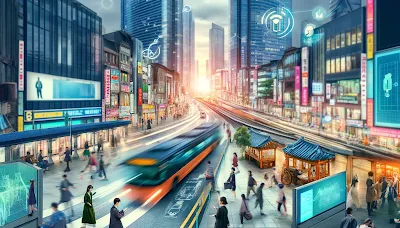South Korea's "ppalli ppalli" (빨리 빨리) culture, translating to "hurry hurry," is a defining feature of the nation’s societal and economic landscape. This fast-paced culture has roots in historical, economic, and social factors and has played a significant role in shaping modern Korea. In this blog post, we'll explore the origins, advantages, and disadvantages of this unique cultural phenomenon.
 |
| Culture of South Korea |
Historical Context
The "ppalli ppalli" culture stems from South Korea's historical, economic, and social background. Over the centuries, Korea experienced numerous invasions and foreign occupations, and in the 20th century, it endured Japanese colonial rule and the Korean War. These events necessitated rapid adaptation and survival. Particularly from the 1960s, South Korea's rapid economic growth further entrenched the "ppalli ppalli" culture.
Advantages of Ppalli Ppalli Culture
- Economic Growth and Innovation: The "ppalli ppalli" culture was crucial in driving South Korea's economic miracle. Quick decision-making and efficient work processes have given Korean industries like electronics, automotive, and shipbuilding a competitive edge. For instance, South Korea's GDP surged from $2.3 billion in 1961 to $1.6 trillion in 2019.
- Improvement in Public Services: This culture has enhanced the efficiency of public transportation systems, with innovations like real-time bus arrival information systems. In Seoul, bus arrival times are accurate up to 94%.
- Technological Advancement: South Korea is known for its fastest internet speeds and the early adoption of 5G networks, which were commercialized in 2019. This rapid technological advancement has significantly contributed to economic and technological progress.
Disadvantages of Ppalli Ppalli Culture
- Safety Issues: The pursuit of speed and efficiency can sometimes compromise safety. High-profile incidents like the collapse of the Sampoong Department Store, which killed 501 people, highlight the negative impact of this culture on safety standards.
- Stress and Burnout: The high pressure to perform in both work and academic settings can lead to significant stress and burnout. According to the OECD, South Koreans work an average of 1,967 hours annually, which is higher than the OECD average and directly correlates with high stress levels.
- Environmental Issues: Rapid industrialization and urbanization have negatively impacted the environment. South Korea is one of the highest greenhouse gas emitters globally, largely due to its swift industrial growth. The country also faces challenges with waste management, contributing to environmental degradation.
- Social Relationships: This culture can negatively affect social interactions, often leading to impatience and rudeness. South Korea has one of the highest traffic accident rates globally, which can be partly attributed to the hurry mentality prevalent in society.
Conclusion
While the "ppalli ppalli" culture has significantly contributed to South Korea's economic growth and technological advancements, it has also led to various issues related to safety, mental health, and the environment. Moving forward, it is essential to strike a balance between efficiency and sustainability to improve overall quality of life.
We hope this post provides a deeper understanding of South Korea's "ppalli ppalli" culture. Feel free to leave your comments or questions below!
